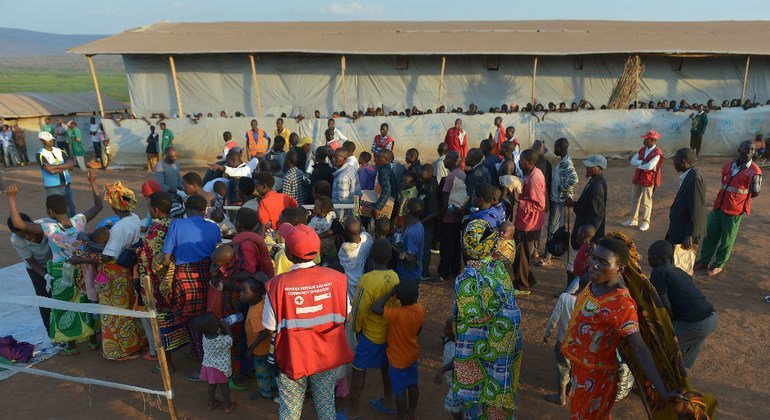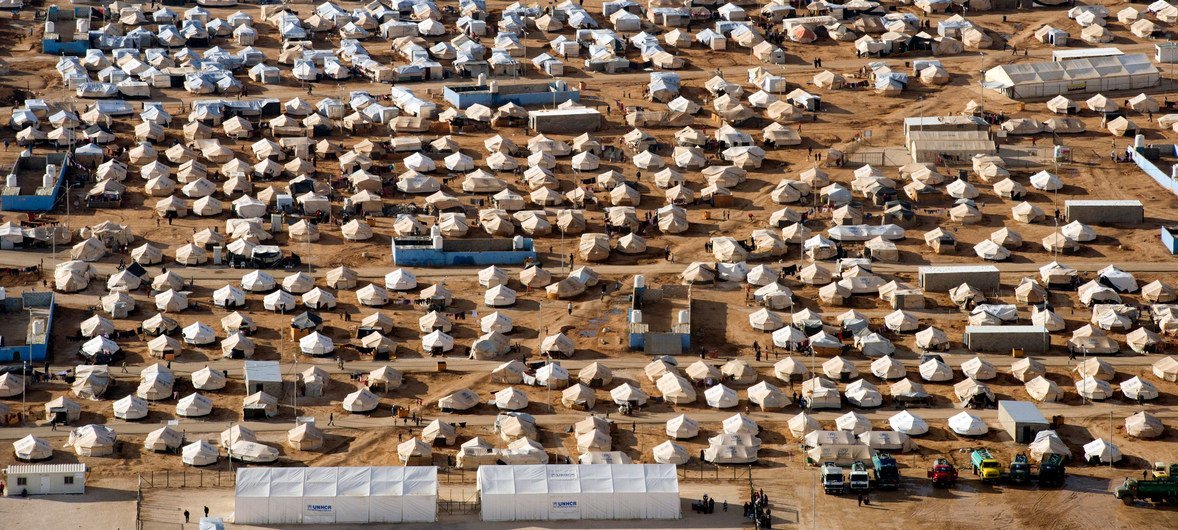UNHCR Warns of Real Impact of Global Funding Shortages on Refugees & Migrants
 Efforts to assist the tens of millions who’ve been forced from their homes are being increasingly constrained by severely limited funds, a new report from the United Nations refugee agency (UNHCR) has warned, urging greater international attention and support.
Efforts to assist the tens of millions who’ve been forced from their homes are being increasingly constrained by severely limited funds, a new report from the United Nations refugee agency (UNHCR) has warned, urging greater international attention and support.
Funds available to help refugees and migrants are steadily falling, said the agency on Tuesday, while the number of those displaced has been rising by the year.
“Based on contributions to date we expect funding for 2018 to meet just 55 per cent of the $8.2 billion that is needed,” Babar Baloch, a UNHCR spokesperson, told reporters in Geneva on Tuesday, noting that in 2017 and 2016, the figures stood at 56.6 and 58 per cent, respectively.
“The consequences for refugees and internally displaced people in particular are becoming all too real.”
Globally, malnutrition rates among refugees are rising and health facilities are increasingly overcrowded, with children missing out on education. In addition, there are growing protection risks because of shortages of personnel to deal with unaccompanied children or victims or sexual violence, added the UNHCR spokesperson.
In a new report on underfunded situations, UNHCR notes that six countries facing refugee and displacement crises – Burundi, Democratic Republic of the Congo, Afghanistan, South Sudan, Syria and Somalia – are particularly badly hit.
In the case of Burundi – the lowest funded globally – only 28 per cent of the $206 million needed has been received, which is having an acute impact on the hundreds of thousands of refugees in need.
In conflict-affected DRC, and countries hosting Congolese refugees, limited funding has hit humanitarians’ ability to help them support themselves, especially young people, and gain access to education and health. There, only 31 per cent of the $369 million needed has been received.
Similarly, Afghanistan, South Sudan and Somalia are also reeling under the effects of the severe funding crunch, having received only 32 per cent, 33 per cent and 37 per cent of what’s needed respectively. In Syria – where needs are almost $2 billion to support close to 12 million internally displaced persons and refugees – only 35 per cent is available.

UN Photo/Mark Garten
An aerial view of Zaíatri refugee camp near Mafraq, Jordan, host to tens of thousands of Syrians displaced by conflict. 7 December 2012.
Need for generous, timely and flexible contributions
To ensure response to the crisis does not falter, UNHCR has called for contributions that are “generous, timely and flexible.”
Flexible funding, said the UN agency, will allow it to adapt its programmes to meet the rapidly evolving needs and assist populations most at risk. Such funding will also facilitate continuation of operations from one calendar year into the next, or from one sector to another depending on the requirements.
“Ideally, all funds raised should be flexible in their implementation period; meaning, UNHCR should be able to carry funds to the following year,” the report notes.
This will help make operations more predictable, and allow cash to be spent when, and where, it is most needed.
Garrett is a skilled author driven by a desire to illuminate global issues through his writing. With a foundation in journalism and international relations, he offers a distinctive viewpoint in his work, exploring the complexities of geopolitical events in depth.




“The situation described in the article is truly heartbreaking. It’s alarming that funding for refugees and migrants is declining while their numbers are increasing. We need to do more to support these vulnerable populations.”
Efforts to assist the tens of millions who’ve been forced from their homes are being increasingly constrained by severely limited funds. It’s crucial for the international community to step up and provide the necessary support to address the growing humanitarian crisis.
It is disheartening to see the global funding shortages putting refugees and migrants at such risk. The statistics show a concerning trend of dwindling support while the number of displaced individuals continues to rise. Immediate international action is necessary to address this humanitarian crisis.
Efforts to assist refugees and migrants are being severely limited by the lack of funds. The rising number of displaced people and the steady fall of available funds are alarming. International attention and support are crucial in addressing this issue. The impact on refugees and internally displaced people is devastating, with growing risks and challenges faced daily. It’s time for a collective effort to ensure the well-being of those in need.
Efforts to assist the tens of millions who’ve been forced from their homes are being increasingly constrained by severely limited funds. As the funds available to help refugees and migrants are steadily falling, the number of those displaced has been rising by the year. Based on contributions to date, we expect funding for 2018 to meet just 55 per cent of the $8.2 billion that is needed. The consequences for refugees and internally displaced people in particular are becoming all too real. Globally, malnutrition rates among refugees are rising, and health facilities are increasingly overcrowded, with children missing out on education. It’s distressing to see the growing protection risks due to shortages of personnel dealing with unaccompanied children or victims of sexual violence.
It’s saddening to see the real impact of global funding shortages on refugees and migrants. The limited funds are severely constraining efforts to assist those who’ve been forced from their homes. We need greater international attention and support to address this urgent issue and prevent the escalation of the crisis.
It’s truly alarming to see the impact of global funding shortages on refugees and migrants. Efforts to support those in need are being severely hampered by the lack of financial resources. The situation is dire, and urgent international attention and support are crucial to address this humanitarian crisis.
It’s disheartening to see the impact of global funding shortages on refugees and migrants. Efforts to support those in need are being hindered by inadequate funds, making the situation increasingly dire. The international community must step up and provide the necessary support to alleviate the growing challenges faced by displaced individuals.
Efforts to assist those forced from their homes are being severely limited by funding shortages. It’s crucial for more international attention and support to be directed towards helping refugees and migrants in need.
Isn’t there a way to increase awareness and prompt more substantial support for the refugees and migrants in need?
Increasing awareness is crucial to garnering more substantial support for refugees and migrants. It is imperative that we collectively prioritize addressing the funding shortages and providing assistance to those who have been displaced from their homes. Let’s work towards ensuring a more secure and sustainable future for all those in need.
It’s truly disheartening to see the impact of global funding shortages on refugees and migrants. The situation is getting worse as the number of displaced people rises while funds to help them dwindle. Urgent attention and support are crucial to address this pressing issue.
Efforts to assist the tens of millions who’ve been forced from their homes are increasingly constrained by severely limited funds. The consequences for refugees and internally displaced people are sadly becoming all too real. Malnutrition rates among refugees are rising, health facilities are overcrowded, and children are missing out on education. We need greater international attention and support to address this critical issue.